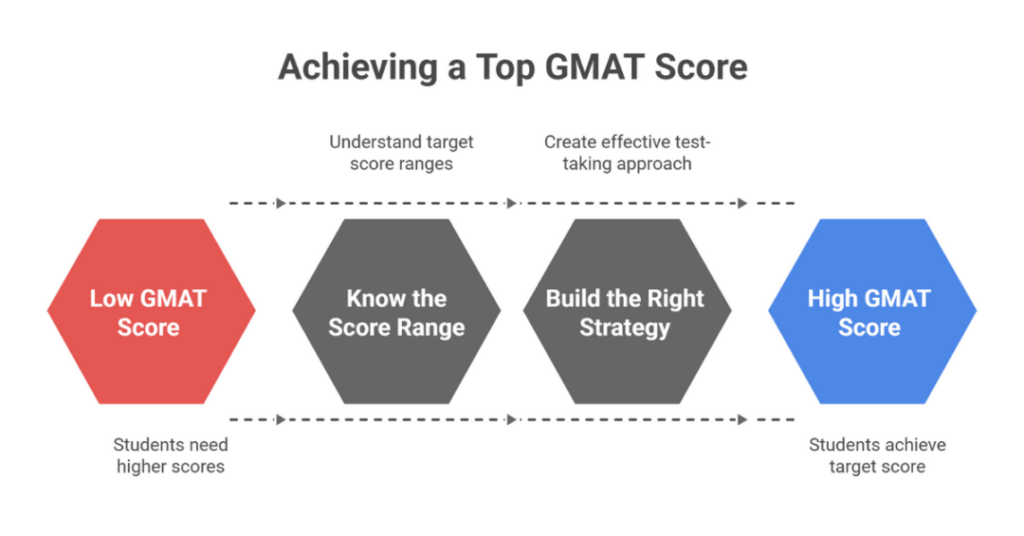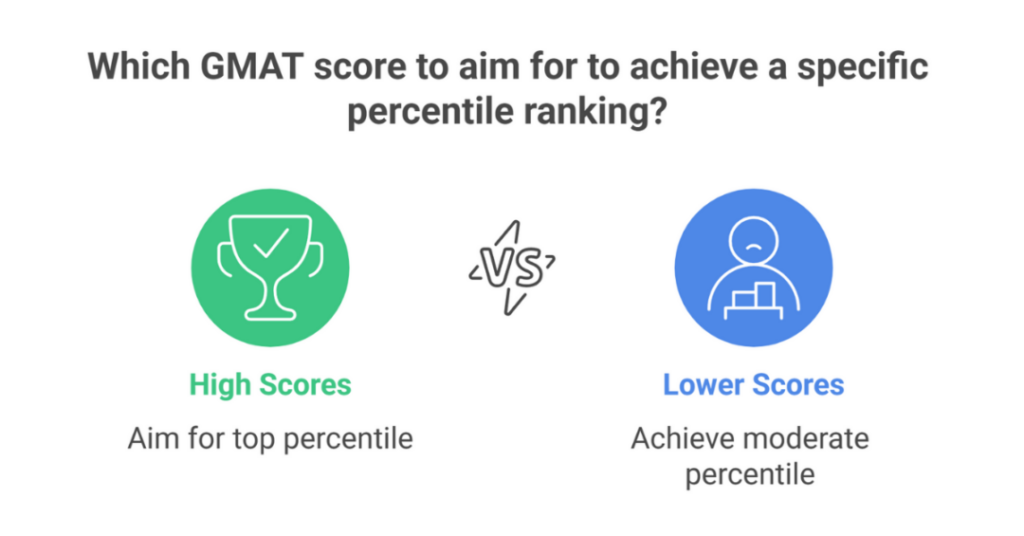25 July 2025
5 minutes read
GMAT Max Score for MBA: How Can Indian Students Achieve a Good GMAT Score for Business School?

Key Takeaways
- GMAT max score of 800 is rare but achievable with focused preparation and strategic use of enhanced score reports.
- GMAT max score depends heavily on your verbal and quantitative performance, not just total study hours.
- GMAT max score unlocks entry into top MBA programs like Harvard Business School with strong percentile rankings.
In India many students aspire to go to the top level business schools such as Harvard Business School or Wharton. Part of getting there involves achieving a very good GMAT score.
Knowing the score range, having accurate knowledge of what is a good GMAT score, and building the right strategy makes a significant difference. Let’s work out together how to aim for that elusive GMAT score of 800.
Understand GMAT: Score Range, Total Score, and Highest GMAT Score
Did you know the GMAT score ranges from 200 to 800? Total GMAT score is usually the primary number that schools are interested in when reviewing MBA applications.

Before we get into some strategies, below are some important things to know:
- Total GMAT Score: Ranges from 200 to 800
- Verbal and Quantitative Sections: Each section of GMAT is scored from 6 and 51
- About two-thirds of test takers score between 400 and 600
| Section | Score Range | Included in Total GMAT Score |
|---|---|---|
| Verbal | 6–51 | Yes |
| Quantitative | 6–51 | Yes |
| Integrated Reasoning | 1–8 | No |
| Analytical Writing (AWA) | 0–6 | No |
Highest Score: What is a GMAT Max Score and GMAT Percentile?
Here’s something interesting: with very few exceptions GMAT test takers earn an 800 on the GMAT. A GMAT 800 and AWA score is rare, but it is achievable.
Let’s review the facts:
- An 800 GMAT score is the highest GMAT score available
- Percent binding shows how your score stacks up against other test takers
- GMAT percentiles change every year based on the data collected from exams
| GMAT Score | Percentile Ranking |
| 800 | 99th percentile |
| 760 | 99th percentile |
| 700 | 88th percentile |
| 650 | 73rd percentile |
| 600 | 53rd percentile |
GMAT Exam Structure: Verbal and Quantitative, Analytical Writing Assessment, and Integrated Reasoning
Not uncommonly, students will struggle with understanding the GMAT exam and how its different components contribute to their scores. Don’t fret, it always seems more intimidating than it actually is!
Once you understand how each section impacts your total score, you will have a clearer understanding of what is in fact a pretty simple process!

Let’s break down the GMAT test’s sections:
- Verbal Section: Evaluates comprehension, style and academic writing style and reasoning
- Quantitative Section: Evaluates problem solving and data sufficiency
- Integrated Reasoning: Evaluates your ability to analyze data from varied sources and formats
- Analytical Writing Assessment (AWA): Evaluates your critical thinking and communication skills.
| Section | Number of Questions | Time Limit | Score Range |
| Verbal | 36 | 65 mins | 6–51 |
| Quantitative | 31 | 62 mins | 6–51 |
| Integrated Reasoning | 12 | 30 mins | 1–8 |
| Analytical Writing | 1 essay | 30 mins | 0–6 |
Good GMAT Score: What Score to Get Into an MBA Program?
Fun fact: A “good” GMAT score is a score in the average range for your target MBA program. There are many students who fixate on a 700+, but even a 650 may be a competitive score!
What is considered a good score?
- Score to get into top 10 business schools: Usually 700+
- Score above 700 often opens more scholarship opportunities
- Good score depends on overall MBA application
| Business School | Average GMAT Score |
| Harvard Business School | 730 |
| Wharton | 733 |
| INSEAD | 710 |
| ISB | 710 |
What is the Average GMAT Score and Percentile Ranking Across Top Business Schools?
Here’s a reality check: GMAT averages differ greatly by school and program. But learning the average GMAT score can help you set goals that are more attainable.
Takeaways:
- Top Schools GMAT average score: 710-740
- Exam percentile ranking impacts how competitive your score is
- Graduate management programs prefer a high percentile exam score over just raw score
| Business School | GMAT Average Score | GMAT Percentile |
| Stanford GSB | 737 | 99th percentile |
| Kellogg (Northwestern) | 727 | 97th percentile |
| London Business School | 708 | 91st percentile |
Quantitative Section and Verbal Section: Cracking the Core of the GMAT
It’s true: the verbal and quantitative sections carry the most weight in your GMAT total score. Understanding how to prepare for these two is crucial.
Breakdown:
- Quantitative section focuses on math fundamentals
- Verbal score is based on grammar, logic, and critical reasoning
- Scaled score from these sections determines your total score
| Component | Focus Area | Importance for GMAT Total Score |
| Verbal Section | Reading, Reasoning | High |
| Quantitative | Arithmetic, Algebra | High |
| IR + AWA | Data & Essay Writing | Not included in total |
GMAT Score Chart, Enhanced Score Report, and How to Read Your Score Report
Reading your official GMAT/GRE/SAT score report can be tricky, but knowing how your scaled score fits into the evidence makes all the different.
Essentially:
- A GMAT performance score chart convert raw scores to scaled scores
- Enhanced score report gives all the details on performance with insights
- Know the difference between official score report and unofficial score report.
| Report Type | Details Included | Purpose |
| Official GMAT Score Report | Scaled Scores, Percentiles, AWA | Sent to MBA programs |
| Enhanced Score Report | Performance by section, pacing | Used for GMAT prep |
| Unofficial Score Report | Preliminary results on test day | Personal use |
What are Some Max GMAT Score Strategies to Achieve a High GMAT for Your MBA Goals?
To achieve a score of 760 GMAT or even 700 GMAT you need to do more than just hard work, you need to do smart work. The best ways to prep for the GMAT not only require discipline but they also require fact.
Best practices for the same:
- Take GMAT practice tests regularly to simulate the real test
- Use an enhanced score report to target weak areas
- Best GMAT prep tools often include algorithm score and human feedback
| Strategy | Why It Works |
| GMAT practice + feedback | Mimics test day and tracks progress |
| Cancel your score option | Use if you underperform |
| Prep using exam data | Insights from prior test-takers |
Conclusion
In order to qualify for admission into MBA programs, it is important to have a high GMAT score. Students can achieve a high GMAT score by knowing the GMAT format, practicing the quantitative and verbal sections, and using available resources (e.g. your official score report or enhanced score report).
If individualized support for your MBA journey interests you, Ambitio can support you in reaching your business school goals!
FAQs
What is the GMAT max score a student can achieve?
The GMAT max score a student can achieve is 800, which is the highest GMAT score possible. It reflects a perfect performance across the verbal and quantitative sections included in the total GMAT score.
What is the GMAT score range and how does the GMAT max score fit into it?
The GMAT score range is 200 to 800, and the GMAT max score of 800 represents the upper limit of this range. Very few test takers score 800 on the GMAT, making it extremely competitive.
How do verbal and quantitative scores affect your GMAT max score?
Your verbal and quantitative performance directly affects your GMAT max score, as both sections are included in the total GMAT score calculation. High scores in both are essential to reach the 800 mark.
What percentile ranking is associated with the GMAT max score?
The GMAT max score of 800 places you in the 99th percentile ranking, meaning you scored higher than 99% of all GMAT test takers globally.
Does the integrated reasoning section affect your GMAT max score?
No, the integrated reasoning score is provided separately and is not included in the total GMAT score, so it does not impact the GMAT max score directly.
How does the enhanced score report help in achieving the GMAT max score?
The enhanced score report gives detailed feedback on your performance, helping you identify weak areas. This targeted prep boosts your chances of reaching the GMAT max score.
Is a 700 GMAT score close to the GMAT max score for top MBA programs?
While not the GMAT max score, a 700 GMAT score is considered a good GMAT score and falls within the top 10% percentile range, making it competitive for many elite MBA programs.

You can study at top universities worldwide!
Get expert tips and tricks to get into top universities with a free expert session.
Book Your Free 30-Minute Session Now! Book a call now




























